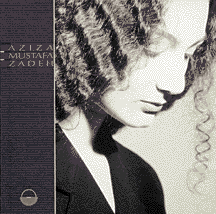|
|
||
|
Aziza Mustafa Zadeh |
||
|
|
Released:
1991 Tracks: 15 Total Time: 74 minutes Musicians: none |
|
|
The first CD bears as its title the
name of the artist, as simple as that. Aziza presents 15 compositions of
her own, where she distinguishes herself primarily as a pianist. These
are 15 pearls on a string that need to be cherished one at a time.
Although the tracks display an astonishing diversity of character and
three of them incorporate her singing voice, the fact that these are all
solo piano pieces, and not a small number at that, brings with it the
danger of surfeit. The same thing happens if you listen to the entire
Goldberg Variations in one go. One needs to give those tracks enough
room to expand and display their nature. But if we give it some time there is
much to be discovered on this CD, and the more I listen to these tunes
the better they get! The track called Inspiration for example
shows us how Aziza uses her voice and how she "thinks"
musically: her scat-like singing takes up the melody her right hand
plays, which is--so typically for mugam--forever moving it seems. To
every note there is attached a little trill, an ornament, so as to never
let a note just be "plain". And she sings as fast as she
plays! Her astonishing vocal abilities are amply displayed in the
"Short variation," based on a theme by Jazz violinist Michal
Urbaniak, Moment. (Given her singing technique I bet she would be
a brilliant wind instrument player). The track Oriental Fantasy
shows how Aziza plays with the cliché of Western conceptions of
"oriental" music: well aware of the strangeness of some of her
harmonies to Western ears and her Azerbaijani origins that make her
prone to become the "exotic other," the "Oriental
Princess of Jazz" as she has been called, she quickly lets go of
supposedly typical oriental harmonies and takes us on a much more idiosyncratic
and unconventional musical journey. |
On the whole, one can say that the amount of "traditional" musical matter is much less prominent than in later productions, and that her compositions are much more avant-garde and jazz-induced. In fact, Aziza draws from the entire texture that the world of music provides for her, and her comment on the initial track Quiet Alone must be understood as a general practice for Aziza's musical understanding. She writes: "This piece was written by my father, interpreted through the prism of my soul. This is a dedication..." In this sense musical allusions are present everywhere and her play is as much a dedication as an exploration of her own personal universe. Tea on the Carpet and Exprompt bear Brackeenesque traits, pieces such as Aziza's Dream are reminiscent of Latin-American harmonies and rhythms, while Character seems to echo Bach, and in what has become the epitome of the art of Jazz improvisation, its variation on a simple, straightforward theme--in superior style--combines modernity with its classical musical heritage. On My Ballad, Aziza for the first time sings in Azeri, exhibiting the mysterious, enchanting beauty of her mother-tongue. Remain my personal favorites: Blue Day, Character, Chargah, I Cannot Sleep, and the last piece Two Candles.
|
|
